Dr. Jean Mayer Global Citizenship Award/Series
2009-2010
2009-10 Mayer Award Recipients
| Sugata Bose | Sarah Chayes | Dana H. Freyer | Sanjoy Hazarika | Amb. Richard C. Holbrooke | Pervez Amirali Hoodbhoy | Ayesha Jalal | Irene Khan | Amb. William Luers | Ian Martin | Jonathan Moore | Hossain Zillur Rahman | Roger Winter |
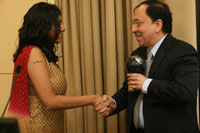 SUGATA BOSE is the Gardiner Professor of History and Director of the South Asia Initiative at Harvard University. Bose was educated at Presidency College, Calcutta, and the University of Cambridge where he obtained his Ph.D.
SUGATA BOSE is the Gardiner Professor of History and Director of the South Asia Initiative at Harvard University. Bose was educated at Presidency College, Calcutta, and the University of Cambridge where he obtained his Ph.D.
His books include Agrarian Bengal: Economy, Social Structure and Politics, South Asia and World Capitalism (1990), Peasant Labour and Colonial Capital in The New Cambridge History of India series, Credit, Markets and the Agrarian Economy of Colonial India, Nationalism, Democracy and Development (with Ayesha Jalal) and Modern South Asia: History, Culture, Political Economy (with Ayesha Jalal). His much-acclaimed work, A Hundred Horizons: the Indian Ocean in the Age of Global Empire, was published in 2006 by Harvard University Press. In it, Bose crosses area studies and disciplinary frontiers and bridges the domains of political economy and culture. Amartya Sen describes A Hundred Horizons as “an excellent historical study, full of contemporary relevance for understanding an important ancestry of present-day globalization”. He is the author of numerous scholarly articles on modern economic, social and political history.
Bose is joint editor with Dr Sisir Kumar Bose of the twelve-volume Collected Works of Netaji Subhas Chandra Bose and joint editor with Krishna Bose of Purabi: the East in its Feminine Gender, a book of translations by Charu C. Chowdhuri of Rabindranath Tagore’s poems and songs. He has made three documentary films on modern South Asian history and politics that have been broadcast on public television in the USA and India. He was a recipient of the Guggenheim Fellowship in 1997 and gave the G.M. Trevelyan Lecture at the University of Cambridge.
Bose has served as Director of Graduate Studies in History at Harvard and is the founding Director of Harvard’s South Asia Initiative. During the last two years Bose has delivered the Rajendranath Das Keynote Lecture at the annual South Asian Studies conference at the University of California-Berkeley, the keynote lecture at the 10th annual conference of the Gilder Lehrman Center at Yale University, the Gustav Pollak Lecture 2008 at the Kennedy School of Government, Harvard University, the keynote lecture at the Biennial Conference of the New Zealand Asia Studies Society and other lectures in India, China, Singapore and Malaysia.
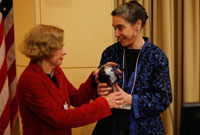 SARAH CHAYES has spent the past year as special advisor to the command of the International Security Assistance Force in Afghanistan, under Generals McKiernan and McChrystal. She has contributed an intimate knowledge of Afghanistan, especially the Pashtun south, to strategic decision-making. In May 2005, she launched an agribusiness in downtown Kandahar, where she lived since the fall of the Taliban in 2001. Its objective is to expand the market for licit local agriculture.
SARAH CHAYES has spent the past year as special advisor to the command of the International Security Assistance Force in Afghanistan, under Generals McKiernan and McChrystal. She has contributed an intimate knowledge of Afghanistan, especially the Pashtun south, to strategic decision-making. In May 2005, she launched an agribusiness in downtown Kandahar, where she lived since the fall of the Taliban in 2001. Its objective is to expand the market for licit local agriculture.
Deeply embedded in Kandahar’s everyday life, Ms. Chayes has gained unparalleled insights into the troubled region. Chayes initially arrived in Afghanistan as a correspondent for National Public Radio, covering the fall of the Taliban in 2001. Prior to that, from her base in Paris, she reported on European affairs, Algeria, Lebanon, Israel/Palestine, and the Balkans.
It was upon the invitation of President Hamid Karzai’s uncle that Ms. Chayes decided to leave journalism in 2002, to contribute to rebuilding Afghanistan. She first served in Kandahar as Field Director for Afghans for Civil Society, a non-profit group founded by Qayum Karzai, the president’s older brother. Under Ms. Chayes’s leadership, ACS rebuilt a village destroyed during the anti-Taliban conflict, launched a successful income-generation project for Kandahar women and the most popular radio station in southern Afghanistan, and conducted a number of policy studies. In 2004, she left ACS to focus on economic development.
Chayes’s book, The Punishment of Virtue: Inside Afghanistan After the Taliban focuses on events in the Afghan south, from the fall of the Taliban through summer 2005. She has participated in pre-deployment training and military colloquia for numerous NATO, US, UK, Canadian, and French commands.
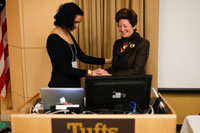 DANA H. FREYER is the Founder and Chair of the Board of Directors of the Global Partnership for Afghanistan. In 2002, Dana Freyer cofounded the Global Partnership for Afghanistan, a New York non-profit and Afghan NGO. She has been the Chair of its Board of Directors since that time. She is also C0-Chair of the Development Committee ad a member of the Governance and Nominating and Program Committees. Through the Global Partnership, Ms. Freyer is working to assist rural Afghans build sustainable livelihoods ad restore their environment by supporting the development of orchard, woodlot, vineyard and related enterprises.
DANA H. FREYER is the Founder and Chair of the Board of Directors of the Global Partnership for Afghanistan. In 2002, Dana Freyer cofounded the Global Partnership for Afghanistan, a New York non-profit and Afghan NGO. She has been the Chair of its Board of Directors since that time. She is also C0-Chair of the Development Committee ad a member of the Governance and Nominating and Program Committees. Through the Global Partnership, Ms. Freyer is working to assist rural Afghans build sustainable livelihoods ad restore their environment by supporting the development of orchard, woodlot, vineyard and related enterprises.
Ms. Freyer was a 2009 Purpose Prize Fellow for her role in restoring Afghan farmers’ livelihoods. This national honor recognizes social enrpreneurs who are using their experience, creativity, and passion to take on society’s biggest challenges. Ms. Freyer retired as a Partner of the law firm Skadden, Arps, Slate, Meagher & Flom LLP in January 2010. She had been head of Arbitration and Alternative Dispute Resolution and Corporate Compliance Program practice groups. She is a Fellow of the Chartered Institute of Arbitrators and the College of Commercial Arbitrators and a member of the Council on Foreign Relations. She has repeatedly been listed as one of the world’s leading lawyers in international arbitration. She has been named by the National Law Journal as one of the top 50 women litigators in America and by Global Arbitration Review as one of “The All-Female Top 30” arbitrators worldwide.
From 1965-68, she was assistant to the Afghan Ambassador to the United Nations in his capacities as Ambassador and President of the UN General Assembly. She has traveled extensively in Afghanistan.
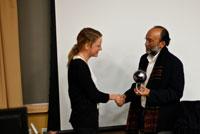 SANJOY HAZARIKA is Saifuddin Kichelew Chair and Professor at the Centre for North East Studies at Jamia Millia Islamia, New Delhi, and Managing Trustee, Centre for North East Studies and Policy Research (C-NES) in the NE of India; Consulting editor for the Sunday Guardian, a new Sunday paper published from New Delhi. Author, essayist and film maker, Mr. Hazarika is one of India’s best known faces and commentators on the issues before the North-east of India, one of the lesser know and studied areas of the world, where conflicts and ethnic problems and challenges abound. He is consulted by governments, national and international organizations on issues of strategic and regional significance. He has developed a flagship health intervention that runs boat clinics on the Brahmaputra river which reaches a quarter million people on islands who, until now were shut out as socially and geographically excluded, from the planning process.
SANJOY HAZARIKA is Saifuddin Kichelew Chair and Professor at the Centre for North East Studies at Jamia Millia Islamia, New Delhi, and Managing Trustee, Centre for North East Studies and Policy Research (C-NES) in the NE of India; Consulting editor for the Sunday Guardian, a new Sunday paper published from New Delhi. Author, essayist and film maker, Mr. Hazarika is one of India’s best known faces and commentators on the issues before the North-east of India, one of the lesser know and studied areas of the world, where conflicts and ethnic problems and challenges abound. He is consulted by governments, national and international organizations on issues of strategic and regional significance. He has developed a flagship health intervention that runs boat clinics on the Brahmaputra river which reaches a quarter million people on islands who, until now were shut out as socially and geographically excluded, from the planning process.
Other significant work has been a campaign to conserve the highly endangered Gangetic Dolphin in the North—east, transforming hunters to conservationists; the dolphin first became the State Aquatic Animal for Assam and then the National Aquatic Animal.
Visiting Professor at the Centre for Policy Research and a member of the National Disaster Management Advisory Board. He serves on various expert committees in India’s Planning Commission and has extensively contributed to national and state (Assam) policy formation and literature on dealing with floods and water management through his policy papers on water resources, trade and disasters. He led a team of 100 enumerators and 20 partner groups, a participative Visioning Exercise for the Government of India, involving more than 40,000 respondents.
He is an award wining former correspondent of The New York Times and launched and edited The North East Page at the Statesman newspaper between 2002 and January 2007. He also writes columns for other newspapers and journals and is a frequent speaker in India and abroad, as well as at radio and television discussions, on issues related to the North-east.
He was a member of the National Security Advisory Board, the Armed Forces Special Powers Act (AFSPA) review committee, of an advisory panel for the NE in the National Commission to Review the Working of the Constitution and has held fellowships at Harvard University, Tufts University and the University of Kentucky. In 2006, he was a “Practitioner in Residence” at the Institute for Global Leadership at Tufts University, which honored his innovation, research and policy advocacy. He is acknowledged as a specialist on migration and his books include, most recently, Writing on the Wall, Reflections on the North-East; Bhopal, the lesson of a tragedy; Strangers of the Mist; Tales of War and Peace from India’s North East; Rites of Passage: border crossings, imagined homelands – India’s East and Bangladesh. He has co-authored The State Strikes Back: India and the Naga Insurgency (with Charles Chasie) published by the East West Centre in Washington, DC.
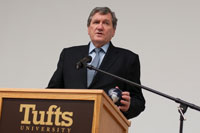 AMBASSADOR RICHARD C. HOLBROOKE served as the United States Ambassador to the United Nations, where he was also a member of President Clinton’s cabinet (1999-2001). As Assistant Secretary of State for Europe (1994-1996), he was the chief architect of the 1995 Dayton Peace Agreement that ended the war in Bosnia. He later served as President Clinton’s Special Envoy to Bosnia and Kosovo and Special Envoy to Cyprus on a pro-bono basis while a private citizen. From 1993-1994, he was the US. Ambassador to Germany.
AMBASSADOR RICHARD C. HOLBROOKE served as the United States Ambassador to the United Nations, where he was also a member of President Clinton’s cabinet (1999-2001). As Assistant Secretary of State for Europe (1994-1996), he was the chief architect of the 1995 Dayton Peace Agreement that ended the war in Bosnia. He later served as President Clinton’s Special Envoy to Bosnia and Kosovo and Special Envoy to Cyprus on a pro-bono basis while a private citizen. From 1993-1994, he was the US. Ambassador to Germany.
During the Carter Administration (1977-1981), he served as the Assistant Secretary of State for East Asian and Pacific Affairs, and was in charge of U.S. relations with China at the time Sino-American relations were normalized in December of 1978.
After joining the Foreign Service in 1962, he served in Vietnam (1963-66), including a tour of duty in the Mekong Delta for AID. He worked on Vietnam issues at the Johnson White House (1966-68); wrote one volume of the Pentagon Papers; and was a member of the American delegation to the Vietnam Peace Talks in Paris (1968-69).
He was Peace Corps Director in Morocco (1970-72), Managing Editor of Foreign Policy (1972-77), and held senior positions at two leading Wall Street firms, Credit Suisse First Boston (Vice Chairman) and Lehman Brothers (Managing Director). He has written numerous articles and two best-selling books: To End a War, a memoir of the Dayton negotiations, and co-author of Counsel to the President, Clark Clifford’s memoir. He previously wrote a monthly column for The Washington Post.
He has received over twenty honorary degrees and numerous awards, including several Nobel Peace Prize nominations. He was the Founding Chairman of the American Academy in Berlin, a center for U.S.-German cultural exchange; formerly President and CEO of the Global Business Coalition, the business alliance against HIV/AIDS; and former Chairman of the Asia Society. Previous NGO board memberships have included the American Museum of Natural History, the National Endowment for Democracy, the Citizens Committee for New York City, the Council on Foreign Relations, and Refugees International. He was Director Emeritus of The Africa-America Institute, was on the Advisory Board of MEMRI, was a Fellow of the American Academy of Arts and Sciences, and formerly a member of the U.S. Board of Governors of Interpeace, and a former Professor-at-Large, Brown University.
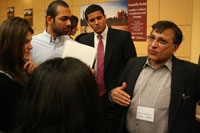 PERVEZ AMIRALI HOODBHOY is professor of nuclear and high energy physics, as well as chairman, at the department of physics, Quaid-e-Azam University, Islamabad. He received his BS, MS, and Ph.D degrees from the Massachussetts Institute of Technology, and remains an active physicist who often lectures at US and European research laboratories and universities.
PERVEZ AMIRALI HOODBHOY is professor of nuclear and high energy physics, as well as chairman, at the department of physics, Quaid-e-Azam University, Islamabad. He received his BS, MS, and Ph.D degrees from the Massachussetts Institute of Technology, and remains an active physicist who often lectures at US and European research laboratories and universities.
Dr. Hoodbhoy received the Baker Award for Electronics and the Abdus Salam Prize for Mathematics. Over a period of 25 years, Dr. Hoodbhoy created and anchored a series of television programs that dissected the problems of Pakistan’s education system, and two other series that aimed at bringing scientific concepts to ordinary members of the public.
He is the author of Islam and Science - Religious Orthodoxy and the Battle for Rationality, now in seven languages. As the head of Mashal Books in Lahore, he leads a major translation effort to produce books in Urdu that promote modern thought, human rights, and emancipation of women.
In 2003 he was awarded UNESCO’s Kalinga Prize for the popularization of science. Also in 2003, Dr. Hoodbhoy was invited to the Pugwash Council. He is a sponsor of The Bulletin of the Atomic Scientists, and a member of the Permanent Monitoring Panel on Terrorism of the World Federation of Scientists. Over the years, he produced and directed several documentary films that have been widely viewed on national television which deal with political, nuclear, and scientific matters. He is frequently invited to comment on these issues in Pakistani and international media.
In 2010, he is scheduled to receive the Joseph A. Burton Award from the American Physical Society and the Jean Mayer Award from Tufts University.
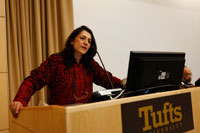 AYESHA JALAL is the Mary Richardson Professor of History and Director of the Center for South Asian and Indian Ocean Studies at Tufts University. Dr. Jalal has been Fellow of Trinity College, Cambridge (1980-84), Leverhulme Fellow at the Centre of South Asian Studies, Cambridge (1984-87), Fellow of the Woodrow Wilson Center for International Scholars in Washington, D.C. (1985-86) and Academy Scholar at the Harvard Academy for International and Area Studies (1988-90). She has taught at the University of Wisconsin-Madison, Tufts University, Columbia University, and Harvard University. Between 1998 and 2003, she was a MacArthur Fellow.
AYESHA JALAL is the Mary Richardson Professor of History and Director of the Center for South Asian and Indian Ocean Studies at Tufts University. Dr. Jalal has been Fellow of Trinity College, Cambridge (1980-84), Leverhulme Fellow at the Centre of South Asian Studies, Cambridge (1984-87), Fellow of the Woodrow Wilson Center for International Scholars in Washington, D.C. (1985-86) and Academy Scholar at the Harvard Academy for International and Area Studies (1988-90). She has taught at the University of Wisconsin-Madison, Tufts University, Columbia University, and Harvard University. Between 1998 and 2003, she was a MacArthur Fellow.
Her publications include Partisans of Allah: Jihad in South Asia, The Sole Spokesman: Jinnah, the Muslim League and the Demand for Pakistan; The State of Martial Rule: the Origins of Pakistan’s Political Economy of Defence; and Democracy and Authoritarianism in South Asia: a Comparative and Historical Perspective. She has also co-authored Modern South Asia: History, Culture and Political Economy and Nationalism, Democracy and Development: State and Politics in India with Sugata Bose. Her fortcoming work includes Battle for Pakistan and Jinnah.
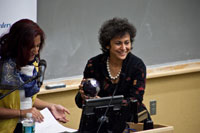 IRENE KHAN joined Amnesty International as Secretary General in August 2001 . The first woman, first Asian and first Muslim to head the world's largest human rights organization, she has led AI through developments in the wake of September 11, confronting the backlash against human rights ; broadening the work of the organization in areas of economic, social and cultural rights; and bringing a strong focus to the issue of women's human rights and violence against women.
IRENE KHAN joined Amnesty International as Secretary General in August 2001 . The first woman, first Asian and first Muslim to head the world's largest human rights organization, she has led AI through developments in the wake of September 11, confronting the backlash against human rights ; broadening the work of the organization in areas of economic, social and cultural rights; and bringing a strong focus to the issue of women's human rights and violence against women.
Irene reformed Amnesty International's response to crisis situations, personally leading high level missions to Pakistan, Afghanistan , Israel / Occupied Territories, Colombia, the Democratic Republic of Congo, Brazil, Mexico, Turkey, Spain, Thailand, the Darfur region of Sudan and Nepal.
Interested in working directly with people to change their lives, Irene helped to found the development organization, Concern Universal, in 1977, and began her work as a human rights activist with the International Commission of Jurists in 1979.
Irene joined the United Nations High Commissioner for Refugees in 1980, and worked in a variety of positions at Headquarters and in field operations to promote the international protection of refugees. From 1991-95 she was Senior Executive Officer to Mrs. Sadako Ogata, then UN High Commissioner for Refugees. She was apPointed as the UNHCR Chief of Mission in India in 1995, the youngest UNHCR country representati ve at that time, and in 1998 headed the UNHCR Centre for Research and Documentation. She led the UNHCR team in Former Yugoslav Republic of Macedonia during the Kosovo crisis in 1999, and was apPointed Deputy Director of International Protection later that year.
Irene studied law at the University of Manchester and Harvard Law School, specialising in public international law and human rights. She is the recipient of several academic awards, a Ford Foundation Fellowship, the 2006 City of Sydney Peace Prize, the Pilkington "Woman of the Year" Award 2002, and the John Owens Distinguished Alumni Award of the University of Manchester. She has been awarded honorary doctorates by the School of Oriental and African Studies of the University of London (UK), Ghent University (Belgium), Manchester University (UK), Ferris University (Japan), Staffordshire University (UK), University at Buffalo Law School - State University of New York (USA), and the American University of Beirut (Lebanon). She has been voted one of the 100 Most Influential Asians and one of the 100 Most Influential Muslims in the UK.
She is the author of The Unheard Truth: Poverty and Human Rights which will be on sale at the lecture.
She is a 2009 Recipient of the IGL Dr. Jean Mayer Global Citizenship Award.
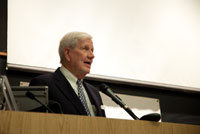 AMBASSADOR WILLIAM LUERS is a 31-year veteran of the US Foreign Service and the former President of the United Nations Association of the USA (UNA-USA). He served as US Ambassador to Czechoslovakia (1983-1986) and Venezuela (1978-1982) and held numerous posts in Italy, Germany, the Soviet Union, and in the Department of State, where he was the Deputy Assistant Secretary of State for Europe (1977-1978) and for Inter-American Affairs (1975-1977). Amb. Luers has been a visiting lecturer at the Woodrow Wilson School at Princeton, at George Washington University in Washington, DC, and at the School of Advanced International Studies at Johns Hopkins University. Amb. Luers is also the former President of the Metropolitan Museum of Art.
AMBASSADOR WILLIAM LUERS is a 31-year veteran of the US Foreign Service and the former President of the United Nations Association of the USA (UNA-USA). He served as US Ambassador to Czechoslovakia (1983-1986) and Venezuela (1978-1982) and held numerous posts in Italy, Germany, the Soviet Union, and in the Department of State, where he was the Deputy Assistant Secretary of State for Europe (1977-1978) and for Inter-American Affairs (1975-1977). Amb. Luers has been a visiting lecturer at the Woodrow Wilson School at Princeton, at George Washington University in Washington, DC, and at the School of Advanced International Studies at Johns Hopkins University. Amb. Luers is also the former President of the Metropolitan Museum of Art.
His areas of expertise include: US Foreign Policy and International Affairs, The United Nations, Russia and Eastern Europe, Latin America, US and Iran, and International Cultural Relations.
In a collaboration between the Project on Justice in Times of Transition, the Institute for Global Leadership, and the Experimental College, Amb. Luers is teaching a course at Tufts this semester on “Talking with the Enemy.”
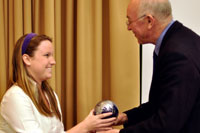 IAN MARTIN has worked for the United Nations in various capacities, most recently as Special Representative of the United Nations Secretary-General and Head of the UN Mission in Nepal (UNMIN) to February 2009, and as Head of the UN Headquarters Board of Inquiry into certain incidents in the Gaza Strip (February-April 2009). He was previously Representative in Nepal of the United Nations High Commissioner for Human Rights, (2005-06); Special Envoy of the Secretary-General for Timor-Leste (2006), Special Representative of the Secretary-General for the East Timor Popular Consultation (1999), Deputy Special Representative of the Secretary-General in the UN Mission in Ethiopia and Eritrea (2000-01), Special Adviser to the High Commissioner for Human Rights (1998), Chief of the UN Human Rights Field Operation in Rwanda (1995-96), and Director for Human Rights of the International Civilian Mission in Haiti (1993 and 1994-95).
IAN MARTIN has worked for the United Nations in various capacities, most recently as Special Representative of the United Nations Secretary-General and Head of the UN Mission in Nepal (UNMIN) to February 2009, and as Head of the UN Headquarters Board of Inquiry into certain incidents in the Gaza Strip (February-April 2009). He was previously Representative in Nepal of the United Nations High Commissioner for Human Rights, (2005-06); Special Envoy of the Secretary-General for Timor-Leste (2006), Special Representative of the Secretary-General for the East Timor Popular Consultation (1999), Deputy Special Representative of the Secretary-General in the UN Mission in Ethiopia and Eritrea (2000-01), Special Adviser to the High Commissioner for Human Rights (1998), Chief of the UN Human Rights Field Operation in Rwanda (1995-96), and Director for Human Rights of the International Civilian Mission in Haiti (1993 and 1994-95).
He also served in the Office of the High Representative in Bosnia and Herzegovina as Deputy High Representative for Human Rights (1998-99). He was Secretary General of Amnesty International (1986-92) and Vice President of the International Center for Transitional Justice (2002-05).
His writings include Self-Determination in East Timor: the United Nations, the Ballot, and International Intervention.
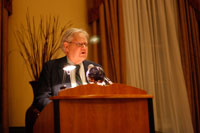 JONATHAN MOORE has worked over a span of fifty years in humanitarian action, public service and education. He continues efforts pursued over the past fifteen years for the United Nations and other international organizations in relief and development programs in poor and conflicted countries such as Cambodia, Afghanistan, Somalia, Haiti, Rwanda, Kosovo, Croatia and Sri Lanka.
JONATHAN MOORE has worked over a span of fifty years in humanitarian action, public service and education. He continues efforts pursued over the past fifteen years for the United Nations and other international organizations in relief and development programs in poor and conflicted countries such as Cambodia, Afghanistan, Somalia, Haiti, Rwanda, Kosovo, Croatia and Sri Lanka.
He is currently an associate at the Joan Shorenstein Center for the Press, Politics and Public Policy at Harvard’s Kennedy School. While serving as director of the Institute of Politics and lecturer in public policy at the school from 1974-86, he built the media program and initiated special courses for newly-elected officials.
From l989-92, as U.S. Ambassador to the United Nations and Representative to its Economic and Social Council, he led negotiations against South African apartheid and global driftnet fishing and efforts to support African economic development. As U.S. Coordinator and Ambassador at large for Refugees from 1986-89, he was the principal official directing assistance, resettlement and repatriation programs world-wide, concentrating on Indo-Chinese, Mozambican and Palestinian refugees.
During l969-l973, he served in Washington as Deputy Assistant Secretary of State, Counselor to the Department of Health, Education and Welfare and Special Assistant to the Secretary of Defense. While Associate Attorney General in the Justice Department under Elliot Richardson, he was deeply involved in the Agnew case and resigned in the “Saturday Night Massacre”. Previously, he had worked on state and national electoral campaigns, in the U.S. Senate, and for the U.S. Information Agency in India and Africa.
He was a member of the PBS Board of Directors and chairman of its National Program Policy Committee from l989-95, and a senior associate at the Carnegie Endowment for International Peace from 1992-94. He was a member of the Consultative Group of International Experts of the International Committee of the Red Cross from 1992-95 and on the board of the U.N. Research Institute for Social Development from 1996-2001.
Ambassador Moore is a senior fellow at the Center for Naval Analyses in Alexandria, Va., serves on the governing boards of CDA Collaborative Learning Projects in Cambridge, Mass. and the Association to Preserve Cape Cod, and is a member of the Editorial Advisory Board of GlobalPost in Boston.
Among other publications, he is the editor of Hard Choices: Moral Dilemmas in Humanitarian Intervention (Rowman & Littlefield, l998); and author of Morality and Foreign Policy (Dickey Center, Dartmouth College 2008), Deciding Humanitarian Intervention (Social Research, Spring 2007), Peace-Building in an Inseparable World (N.E. Journal of Public Policy, Winter 2004-05), The U.N.and Complex Emergencies: Rehabilitation in Third World Transitions (UNRISD, Geneva, l996) and Morality and Interdependence (Rockefeller Center, Dartmouth College, l994).
He lives in Weston, Massachusetts with his wife Katie, and they have four children, Joan Brooke, Jennifer, Jocelyn and Charles, and four grandchildren, Kyra, Niamh, Tessa and Jonathan.
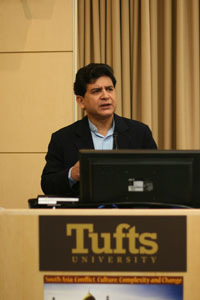 HOSSAIN ZILLUR RAHMAN is Executive Chairman of the Dhaka-based thin tank Power and Participation Research Centre (PPRC), a Dhaka-based think tank in 1996 and was for over twenty years a leading researcher at the Bangladesh Institute of Development Studies specializing on poverty and governance issues. He combines degrees in Economics (Masters, Dhaka University) and Political Sociology (Ph.D, Manchester University).
HOSSAIN ZILLUR RAHMAN is Executive Chairman of the Dhaka-based thin tank Power and Participation Research Centre (PPRC), a Dhaka-based think tank in 1996 and was for over twenty years a leading researcher at the Bangladesh Institute of Development Studies specializing on poverty and governance issues. He combines degrees in Economics (Masters, Dhaka University) and Political Sociology (Ph.D, Manchester University).
Dr. Rahman is the author of Rethinking Rural Poverty (SAGE, 1995), Local Governance and Community Capacities (UPL,2002), Unbundling Governance (PPRC, 2007), Researching Poverty from the Bottom (Grameen Trust, 2007) and numerous articles.
Dr. Rahman was the lead drafter of the poverty reduction strategy of the government of Bangladesh and was on the SAARC Poverty Commission. Dr. Rahman was appointed Advisor (Minister) for Commerce and Education in the Caretaker Government of 2008 and was credited with a lead role in the successful return of the country to electoral democracy. Dr. Rahman was awarded the Dr. John Meyer Global Citizenship Award by the Institute for Global Leadership, Tufts University in 2009.
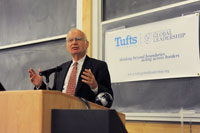 ROGER WINTER has worked on issues of peace, war, humanitarian assistance, civilian protection, and advocacy in Sudan - first as Executive Director of the non-profit U.S. Committee for Refugees from 1981 to 2001 and then as Assistant Administrator of USAID and as the Deputy Secretary of State’s Special Representative on Sudan from 2001 to 2006. Currently Mr. Winter advises the Government of Southern Sudan on a voluntary basis, and he was profiled in the article, The Man for A New Sudan.
ROGER WINTER has worked on issues of peace, war, humanitarian assistance, civilian protection, and advocacy in Sudan - first as Executive Director of the non-profit U.S. Committee for Refugees from 1981 to 2001 and then as Assistant Administrator of USAID and as the Deputy Secretary of State’s Special Representative on Sudan from 2001 to 2006. Currently Mr. Winter advises the Government of Southern Sudan on a voluntary basis, and he was profiled in the article, The Man for A New Sudan.

